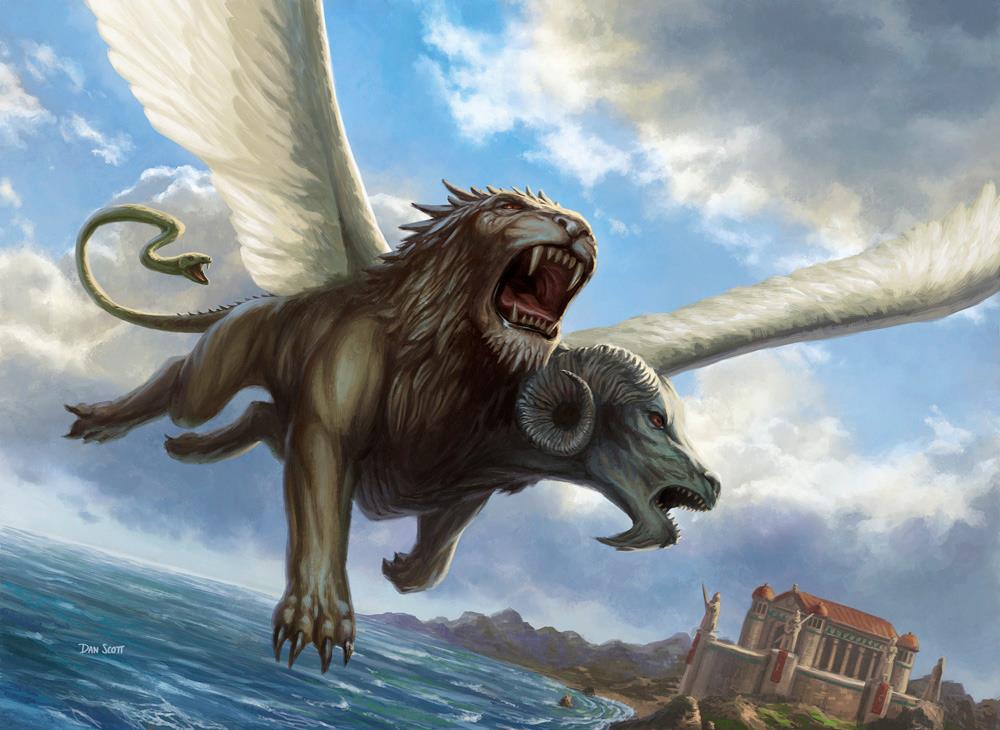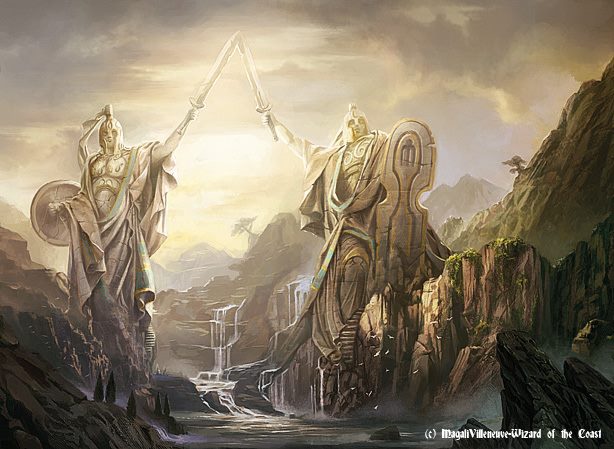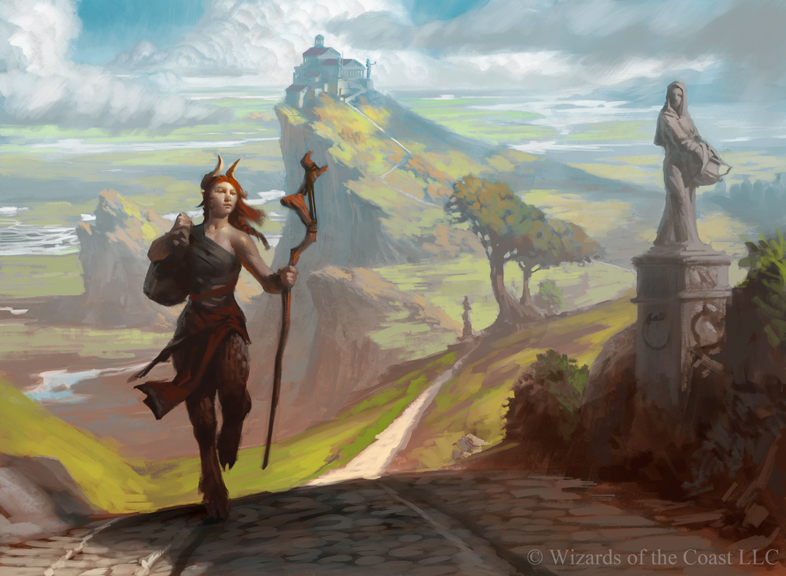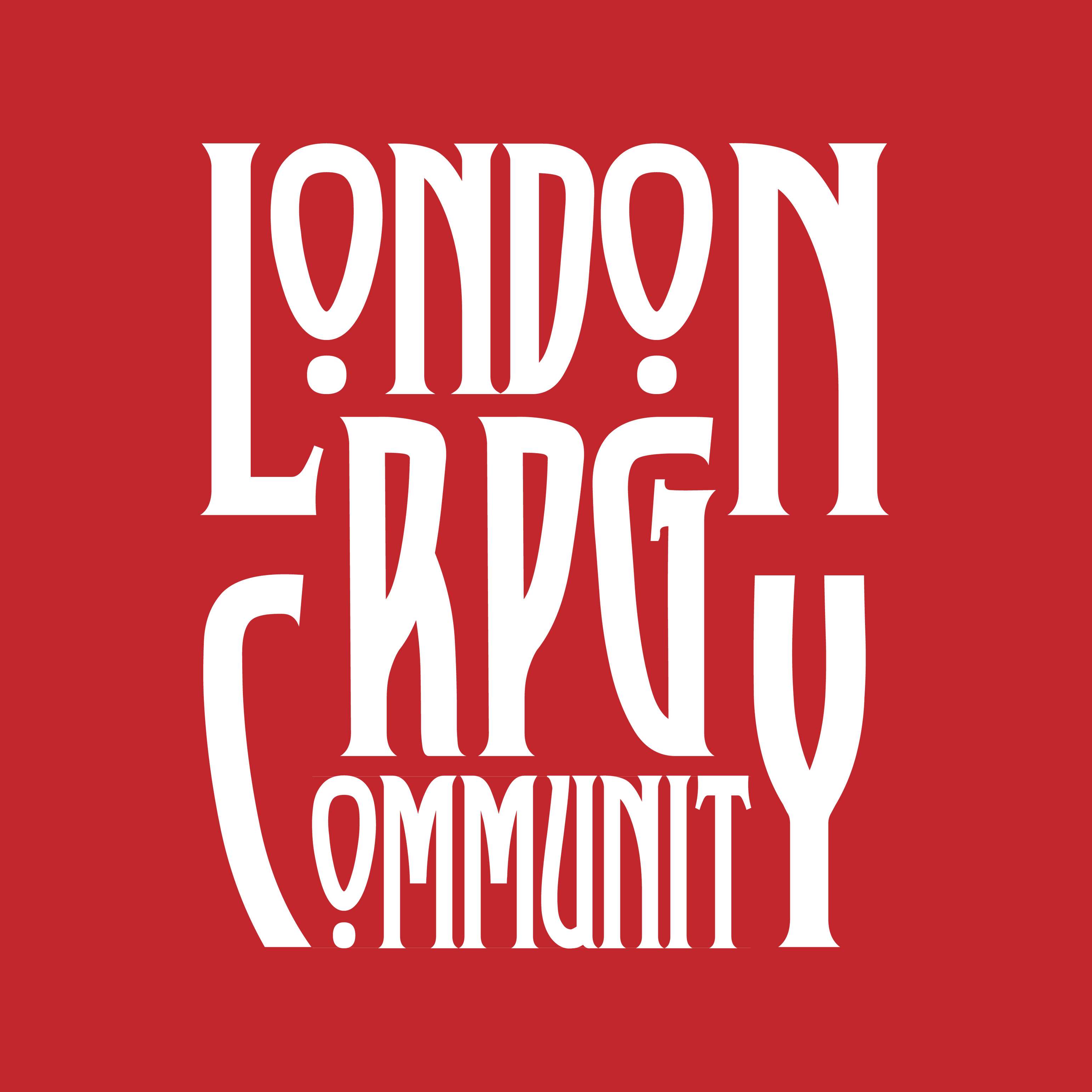
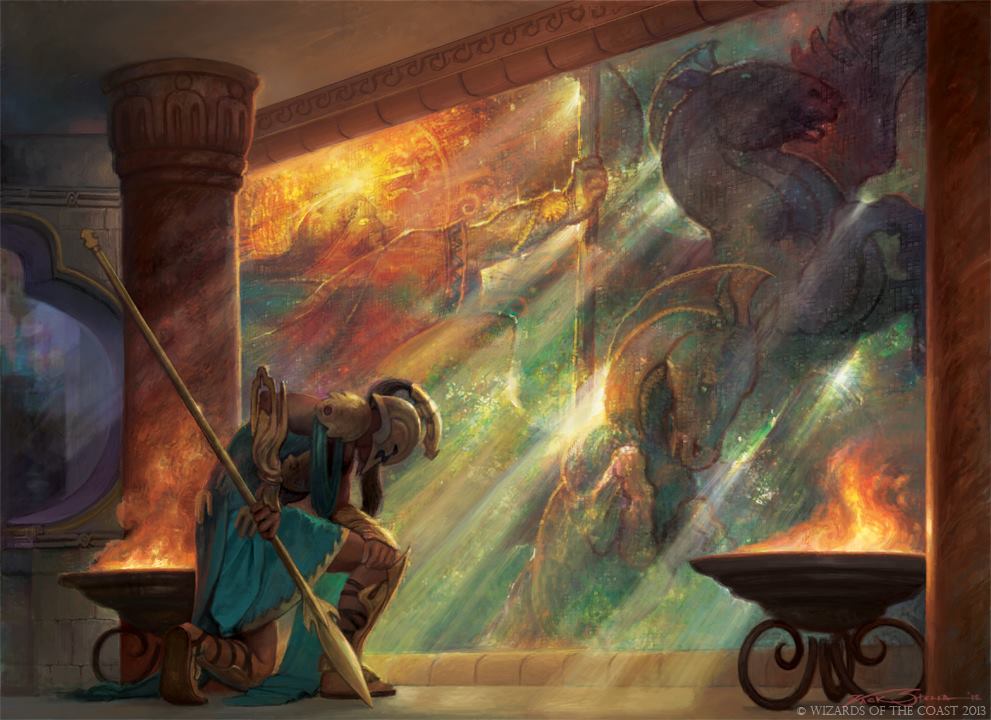
player's guide


player's guide
Contents
Credits
Campaign Dungeon Masters
This campaign is run by Rob CJ and Jonny L.
Layout and Editing
The contents of this Guidebook has been put together by Rob CJ, Jonny L, and Jonathan with lots of help from the D&D setting book Mythic Odysseys of Theros, and Encounters in Theros, a Dungeon Master's Guild supplement.
Art & Images
Chosen by Heliod: Zack Stella
Akroacn Crusader: Johann Bodin
Xenagos, The Reveler: Jason Chan
Guardians of Meletis, Magali Villeneuve
Voyaging Satyr, Tyler Jacobson
Coastline Chimera, Dan Scott
This document is unofficial Fan Content permitted under the Fan Content Policy. Not approved/endorsed by Wizards. Portions of the materials used are property of Wizards of the Coast. ©Wizards of the Coast LLC.
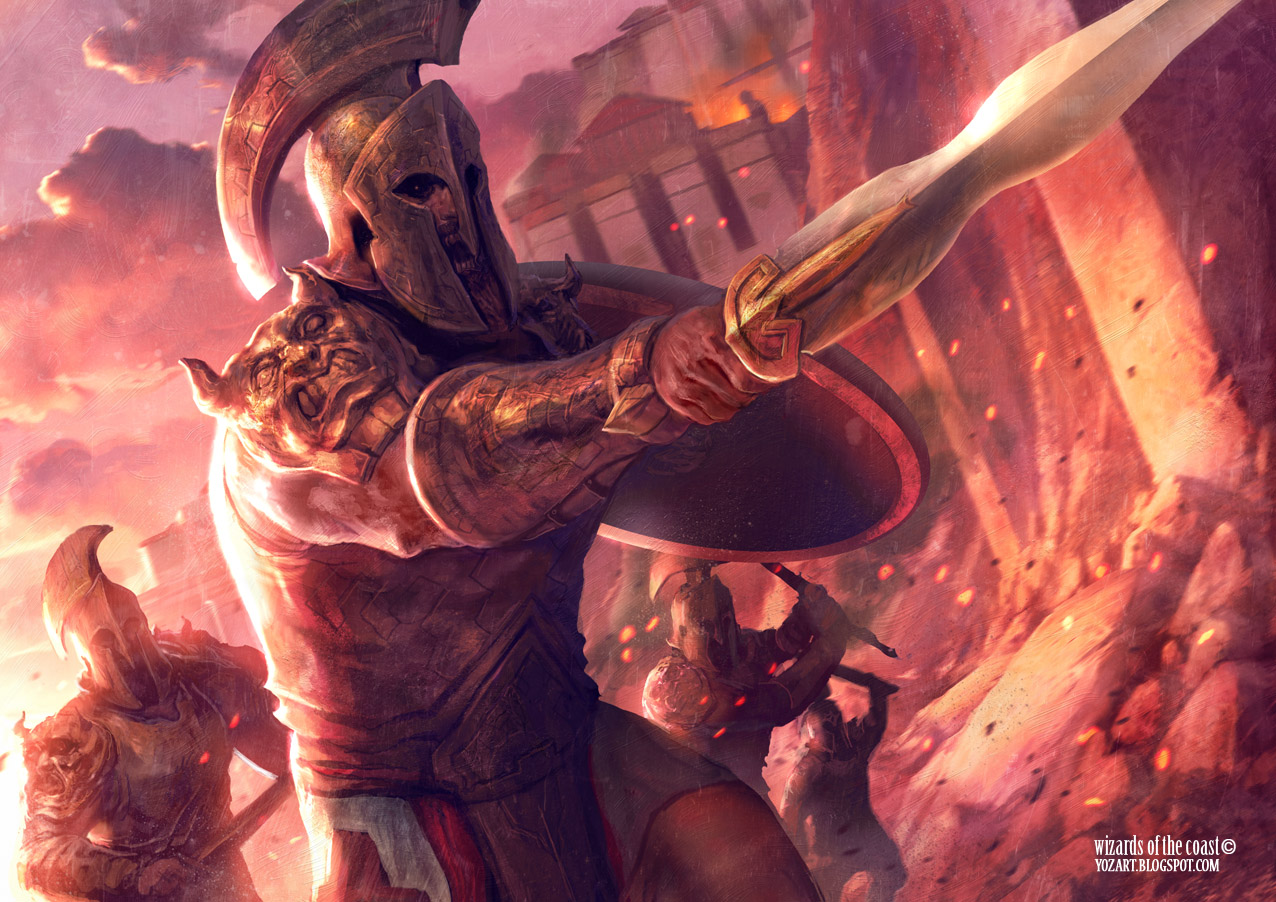

Introduction
Welcome to the campaign notes for Theros Rising on LRC. The aim of this document is to explain where in the timeline / lore of Theros the game is set, so that you can explore the available source material out there. Also, to share the basic details about the map and the Gods so that you can jump right in, to update you on where the main campaign beats has got to, and to guide character creation
What this document won’t cover: The history of Theros; but you can find that out there The details of each game session; write ups from the PCs in the chat are so much more welcome than the DM typing out what “should” have happened, or the hidden details about each location.
Theros is set in a world akin to ancient Greece. Before going any further therefore we should explain therefore that (i) Theros is a low technology world and (ii) the Gods are important.
The low technology factor means that travel is difficult and sustaining your living can also be a challenge. You will need to risk journeys across open planes full of monsters, delver into forests where ancient creatures lurk and cross the fierce seas. Some journeys will start with these challenges, while other times you will find adventures waiting for you in the village you grew up in.
Secondly the gods in this realm are a big part of the narrative - they choose champions, they provides boons to their worshipers and they punish those that meddle in their plans. The Gods are demanding, petty and often jealous. They will form core plot hooks for adventures and could ultimately be an opponent for the heroes.
Nyx, Realm of the Gods
When mortals sleep and dream on Theros, they are said to "visit Nyx," the proverbial land of night and the home of the gods. Therefore, dreams are seen as gifts from the gods. When the gods appear to mortals, each is "infused" with Nyx itself. Where the god's features or form would be shadowed, instead the night sky is visible, as though the gods occupy the daylit world and the nighttime world at once.
Timeline
Theros has a reasonable amount of written history in the DnD 5e Sourcebook and online. The key element for this campaign is that we start the campaign after the fall of Xenagos - the planeswalker who tried to become a God.

Gods of the Pantheon
Heliod, God of the Sun
Heliod represents law, justice, retribution, and the bonds of kinship. Heliod presides over matters of family honor, questions of morality and virtue, speeches, marriages, acts of protective bravery, dawn meals, and self-sacrifice. Heliod's name is often part of legal proceedings, and sacrifices to him are made in times when the greatest aid—or the strictest justice—is needed.
Personality
Heliod radiates with pride and self-assurance. His presence fills the sky with light, blocking mortal access to the dark, starry view of Nyx, and in person he has the same overwhelming aura of awe and brilliance. He is convivial and gregarious, making friends and forming bonds easily, and he sees himself as the ally to all. But others know that Heliod can be fickle in his loyalty. Heliod's greatest ally today might be the target of his retribution tomorrow.
Worship
Heliod is the sun god, literally bringing the light of day to the world, so almost everyone on Theros pays at least tokenistic acknowledgment to him. Some families have a custom of winking in the direction of the dawn's light first thing in the morning, a gesture of respect to the sun god's luminous eye. Heliod's devoted worshippers are mainly humans and Laggona Band centaurs, who celebrate Heliod on the first clear-skied morning of every month.
Temples to Heliod often feature stairs up to a rooftop courtyard, enabling sun worship. The largest holiday aligned with Heliod is the summer solstice, celebrated with three days of ceremonious feasting, weddings, and oaths of loyalty.
Heliod wields Khrusor, the Sun Spear, a weapon blessed with his power that can be pitched down from the heavens to any point on Theros.
Thassa, God of the Sea
Thassa is the god of the sea and also presides over aquatic creatures and the secrets of the briny deep. But she is also the god of ancient knowledge, murmurs, gradual change, introspection, vast distances, long voyages, and far-ranging searches. Thassa might also be described as the god of patterns, such as those of tides, currents, ripples in water, and even the passage of time.
Personality
Thassa is the god who is least likely to be satisfied with the status quo, but also the least likely to rush to change. She is constantly striving to resculpt the land, changing coastlines and upending institutions for the purpose of slow, eventual, unfolding change.
When she speaks, she often uses the future tense, always referring to what tomorrow will bring, forever uninterested with the reality of today. Thassa is slow to anger but implacable once roused. Her anger can grow like a rumbling, cresting, unstoppable wave, taking out whole villages with its fury—then subside with the tide, dragging the evidence of her wrath calmly out to sea.
Worship
Tritons and the humans of Meletis comprise most of Thassa's worshippers, as well as all who venture out to sea, whether for exploration, commerce, or war. Although tritons exalt her above all other gods, she shows no favoritism toward them, seeming equally impassive to all mortals. She is worshipped with offerings of fish and salt by the poor, offerings of pearls and nacre by the rich, and with murmured prayers and quiet contemplation by all.
Thassa wields Dekella, a two-pronged spear. Wielding Dekella allows her to control the tides and stir the seas into whirlpools.
Erebos, God of the Underworld
When the sun first shone on Heliod, god of the sun, the first shadow was cast. When Heliod saw it, he feared and banished it, sending it beyond the so-called Rivers That Ring the World, the five rivers that form a boundary between Theros and its Underworld. That shadow became Erebos, the god of death. In time, Erebos accepted his role, knowing that although Heliod had banished him, he would always stand behind the sun god.
Domains
Erebos rules over death and the Underworld, but these aren't his only duties. Because of his own origins, he is also the god of misfortune, ill fate, begrudging acceptance, envy, and bitterness. And because he is lord of the Underworld, where gold is common and valueless, he is also the god of wealth.
Although it might seem as though Erebos is connected to Nyx more closely than the other gods, this isn't the case. Erebos's realm lacks both the sun and the night.
Personality
Erebos is an effective warden and lord of the Underworld realm. He is not without compassion, but his compassion is limited to feeling on behalf of others what he himself feels, and his acceptance of his fate means that his lieges, the dead, must accept theirs. He idly envies the sunlit world of the living, but only in a daydream-like way. He knows that all mortal souls will eventually join him, which affords him a kind of satisfaction and certainty. When others suffer, it brings Erebos peace, but not glee, because the alienation and banishment of others enables them to identify with his own.
Worship
The god of the underworld is worshipped by three distinct sets of mortal beings: those who exalt death, those who desire wealth, and those who pray for acceptance of their fates. The first group is the smallest but most dangerous; they seek to bring about a confrontation between Heliod and his shadow. The second group is largest.
Because the dead leave their earthly wealth behind, Erebos has become associated with that wealth, as well as with the abundance of (to him, pretty but valueless) gold in his realm. The final group is closest to Erebos's heart—those who have been cast out and who seek peace with their fate.
Erebos wields Mastix, a golden-handled whip with an impossibly long lash, like a thin shadow that stretches on forever.
Purphoros, God of the Forge
Purphoros is the god of the forge, the restless earth, and fire. He rules the raw creative force of heat and energy that fills the souls of sentient beings. His energy emerges as chaos, something to be harnessed and shaped by labor and passion. For this reason, Purphoros is also the god of artisans, of obsession, and of the cycle of creation and destruction.
Personality
To sit in the presence of Purphoros is to be inspired. He forges the most ornate and delicate items only to dash them into flame and start again. He is reasonable yet ultimately follows no rules save his own creative and destructive impulses. Sometimes, this can mean covering a whole area with lava to make way for something new. His main flaw is that of frustration, of feeling limited and constrained. He is forever pushing against the barriers of mortal imagination, sensing that there is much more to express. This can cause him to plummet into despondency and then lash out at the world with raw destruction.
Worship
Followers of Purphoros, the god of the forge, brought the secret of bronze to Theros, leading to stronger objects and armaments than any created previously. And the most sanctified shamans of Purphoros also possess small quantities of a new metal said to have come from Purphoros's forge: iron. But it's not only smiths who worship him. Artists, human and satyr especially, seek his aid, ascending to altars on volcanic slopes to breathe deeply of the creative vapors. Warriors give him homage when lighting a bonfire. Potters inscribe their works with markings meant to honor him.
Purphoros wields Akmon, a large hammer whose head slightly resembles an anvil. A blow from Akmon can render the earth molten, and when it strikes metal, each spark becomes a new enchantment, some of which even take on life.
Nylea, God of the Hunt
Nylea is the god of the hunt, the seasons, and the forest. Because of her reign over the hunt, she is also associated with predation and hunger. And because of her rule of the seasons, she is also the god of metamorphosis and rebirth. Nylea receives strength and peace from sleeping inside the chrysalis at the center of her grove.
Personality
Nylea is usually aloof and thoughtful, but with her companions she is playful and joyful. She has a feral, animalistic side and shoulders the responsibility of keeping the forest a haven for animals, preventing the spread of humans into her domain, and letting the natural world have free rein. Nylea is quick to anger and vengeance if something threatens her realm. The seasons change at her whim, and she delays the change if angered. She is allied with Purphoros, and permits him to unleash fires on the forest when it is in need of cleansing or when humans are encroaching too far into the wilds.
Nylea has a tumultuous relationship with Karametra, the god of the hearth. Karametra is infuriated by Nylea's interference in the seasons. In turn, Nylea is disgusted by agriculture, which she sees as an aberration from the natural cycle of the world.
Worship
Nylea doesn't have temples built in her honor. She dislikes the construction of temples and cities in general. Nymphs of all kinds pay homage to her, as do sentient humanoids such as satyrs, centaurs, and many citizens of Setessa. Her holy sites often consist of a tree surrounded by a cloud of butterflies. When one of these trees is spotted, people say she is near. Her human followers tend to be loners, outcasts, and those who choose to live in the wilds. Some city dwellers will come into the forest to honor her, especially to pray that the seasons will change in a timely manner. Nylea hates sacrifices and is notoriously hard to please.
Depending on their offerings, worshippers could as easily anger her as win her blessing. She enjoys seeing acts of kindness and protection of creatures both domesticated and wild.
Nylea wields Ephixis, a shortbow. Her companion, the nymph Theophila, conjures illusions for target practice. Nylea has no qualms with predation, but she loathes hunting for sport. She personally kills poachers in the Nistos Forest who have not asked for her blessing to hunt her animals.
Ephara, God of the Polis
Ephara is the god of city-states and building. Ephara represents and presides over any organized state of people, but in particular she is worshipped in Meletis. Ephara is also the god of industry, civic wisdom, scholarship, religious sculpture, friezes, architecture, societal progress, social philosophy, and the protection and stability of the city.
The character of Ephara is inspired by a partial aspect of Athena, the Greek goddess of civilization and the city of Athens (traditionally said to be named after her). To further support this analogy, the familiars she sends to her thaumaturges have the shape of owls, animals sacred to Athena. She is portraited with a jar with flowing water on her shoulder, much like the Aquarius, usually associated with Ganymede.
Phenax, God of Deception
Phenax is the god of cheats and liars. He governs gambling, deception, betrayal, isolation, planning, and secrets. He is worshipped by criminals and others who wish to subvert the rules. Phenax is also associated with the Returned, Theros' undead, who follow his path back from the Underworld.
As a mortal, Phenax was the first to escape the underworld. Cheating death this way likely set him on a path to join Theros' pantheon.
In the Theros block saga, the nightmare planeswalker Ashiok strikes a deal with Phenax. In exchange for laying waste to the polis of Iretis to make a new polis for the Returned, Phenax made the planeswalker invisible to the other gods allowing Ashiok to operate under their gaze without detection. Phenax was amused by Ashiok's plans.
The character of Phenax is inspired by Hermes, Greek god of thieves, travelers, and border crossings, guide to the Underworld; and Dolos, son of Erebus, spirit of trickery and guile. The name is likely from the Ancient Greek word φέναξ (phénax), meaning cheat, quack or impostor.
Mogis, God of Slaughter
Mogis, the dark twin of the god Iroas, is the horned god of wrath and pain. He is associated with slaughter, violence, bloodlust, war, and cannibalism. He is worshipped by minotaurs and is known to take the form of a minotaur, as well. His "red eye" is used as a profanity in Meletis relating to violent death, while Akroan warriors are warned of the threat of giving in to his whims.
The character of Mogis is inspired by a partial aspect of Ares, the Greek god of war, but he is actually closer to Ares' sons Deimos ("Dread") and Phobos ("Fear").
Klothys, God of Fate and Destiny
Klothys has a mask on either side of her face, which implies she's a goddess with three aspects. Her long hair twists around her horns. She holds a lance-sized spindle in her right hand. Her eyes are covered to signify that Destiny is blind and impartial. Her left thumb has a sharp golden nail to cut the threads of destiny. She, alongside Kruphix, was one of the oldest gods.
The character of Klothys is inspired by Clotho, one of the Moirai or Fates, Greek mythological incarnations of destiny. Of the Moirai, Clotho spun the threads of destiny, Lachesis measured and Atropos cut. Klothys also seems to take aspects of Persephone, namely being a female deity confined to the underworld, and Hecate, a chthonic triple goddess. Her design also seems to be partially based on Lady justice as the blindfolded goddess, which is in turn based on the Roman goddess Iustitia.
The Fates were earlier depicted in the Theros block on Triad of Fates and Fate Unraveler. One of them was named Andrasteia. Although she and her sisters controlled many things in the destinies of all in Theros — even at times the gods themselves — there were rules that should not be bent, and a few that must never, ever be broken. There are also fate weavers, such as Tymna, humans who have learned the magic of the Fates, and can manipulate the threads for their own machinations.
Karametra, God of Harvests
Karametra is the god of the hearth, agriculture and harvest. She is a serene, wise god who values community, stability, and the balance of nature. She is the patron of Setessa, and associated with charity and orphans. Karametra has a tumultuous relationship with Nylea, whom she speaks of as her sister. Though she governs the realms of fertility, motherhood, and agriculture, Karametra is not a pacifist god. Her signature item is a scythe, signifying both the harvest and the natural laws of life and death. She is often depicted with a sable, a weasel-like creature of great ferocity.
The character of Karametra is inspired by Demeter, Greek goddess of harvest and fertility, and Hestia, Greek goddess of the hearth.
Athreos, God of Passage
The shrouded Athreos is the River Guide, the divine ferryman of the dead across the Rivers That Ring the World to the Underworld. Silent, bent, and tattered, he patiently fulfills his role. Athreos is never without his signature staff, a gnarled length of dark wood. When he lays his staff over one of the five Rivers, it becomes a boat to carry the dead.
Athreos cares little for the other gods' conflict with mortals: his primary concern is safe passage for the dead. When he gathers the newly dead to be ferried across the Five Rings, Athreos sends skeletal griffins to fetch those who stray. The custom on Theros is to craft a funerary mask of clay for the newly departed. In this way, the identities of the deceased are "framed" for Athreos, so that he can mark their proper passage. Such masks are broken into shards called ostraka and used as barter in the Underworld.
The Binding of the Titans
Long ago, the titans had been sealed away in the Underworld by the combined might of the gods, and it was Klothys who volunteered to serve as their eternal jailer. While Erebos ruled his realm beyond death, Klothys acted as an eternal seal to ensure the titans remained imprisoned.
Beyond Death
The aftermath of Xenagos’ ascension to godhood, his death, and the death of Elspeth had revealed a disturbing reality: the gods were replaceable. As war broke out among the gods themselves, Erebos was consumed by his hatred of Heliod, and so Erebos began to lose control of the souls of his realm.
When countless souls dared defy fate to reverse their own deaths, Klothys was livid. In reaction to all those who sought to reverse their own deaths, Klothys dispatched numerous Agents of Fate to ensure they did not succeed. These Agents wielded Klothys's thread in pursuit of their goals. To properly deal with the soul of the Planeswalker Elspeth Tirel, a special agent would be needed. For this task, Klothys created Calix. As the God of Destiny's greatest masterpiece, Calix was solely created to carry out the will of Klothys.
Keranos, God of storms and visions
Keranos embodies the fury of the storm and the sudden blaze of epiphany. A god of little patience and less mercy, he dispenses insights and blasts of lightning in equal measure. Keranos is intolerant of mortals, whom he sees as reckless. Yet he also respects those who take action with a clear purpose, especially if they seek his approval first. Such individuals earn a two-edged blessing: momentary glimpses of the future, but the inability to change what is to come.
Among mortals, Queen Cymede of Akros is Keranos's greatest servant and has done much to spread the god's worship in the city. The character of Keranos collects aspects of the Greek gods Zeus (lightning and storms) and Apollo (oracles).
Pharika, God of Affliction
Pharika, the god worshipped mostly in Setessa's Winter Nexus, is apparently associated with grief and old age. Deadly poison can be healing medicine in small amounts, and this dichotomy is reflected in the god whose province is such tinctures. Pharika is the keeper of apothecary knowledge and the source of dark magic, potions and poison. She is also the mother of all Gorgons, who are said to have hidden many cures within their blood. Pharika herself is thought to take the form of a gorgon. Prayers to her are usually letters rolled up in ceramics and dumped in bogs. Stories say that the secretive god has hidden medicinal knowledge within the natural world, such as in basilisk blood, although most die trying to learn them.
The character of Pharika is inspired by aspects of several Greek gods. One could think about Hecate, goddess of witchcraft, herbs and poisonous plants, Circe, goddess of magic and plants, or Asclepius and his son Telesphorus who dealt with medicine and recuperation from illness. She is also remarkably similar to the Egyptian god Serket, which also represents the dichotomy of poison and cure. Her name may have been partly taken from the Ancient Greek word φάρμακον (phármakon), which could refer to a curative drug or a poison.
Iroas, God of Victory
Iroas is the god of honor and victory in war. He is thought to take the form of a centaur, though his lower half is that of a bull. He governs both personal valor and bravery in battle, and thus he also governs warfare. He is twin to Mogis, god of slaughter, who commands the dark and brutal side of war, and the two spar constantly. Iroas is worshipped mostly in Akros, and is apparently its patron. He established the Iroan Games in that city's arena.
The character of Iroas is inspired by Athena, Goddess of Wisdom and War, and Nike, Goddess of Victory. His name was likely taken from the Modern Greek word ήρωας (íroas), meaning hero.
Kruphix, God of horizons and time
Kruphix is the eldest of the gods. The enigmatic god has dominion over the potential, the distant, and the unseen. Thus, he is seen as an oracle of dreams. He also governs navigation, mystery, and the cycles of time and is the keeper of mysteries that no others are meant to learn.
The reclusive Kruphix speaks rarely and counts few worshippers. He often takes no real form but appears only as a Nyx-filled space in the sky. The temple of Kruphix is built over a cataract at the very edge of the world. His main oracle is a woman named Kydele.
When Xenagos ascended, Kruphix announced the Silence where the Gods were forced to not interfere temporarily in mortal affairs until they could sort the mess in Nyx. He and his oracle watched from his temple as Elspeth and Ajani defeated Xenagos and she was subsequently betrayed and slain by her patron Heliod. He discusses with her the greatest secret of Theros: the Gods of Theros arose from mortal belief that took form within the fabric of Nyx. Even he as the oldest does not predate mortal belief. He saw the other gods slowly emerge based on specific domains such as death, the sun, the sea, the forest, and the forge. This was followed by Gods in more abstract domains such as war, deception, insight, love and more.
He also shared that though the domains remain, the gods themselves change. An example was that Heliod was not always the Sun God. However, when he took his place in the sky, within a few years to mortal perception he had always been the Sun God. Kruphix himself does not know the reason for their existence but he does not wish to know either.
Due to the events of Xenagos's ascension and fall, Kruphix finds himself in a conundrum. Although the oldest God had knowledge of planeswalkers from olden times, he was troubled by what he had seen in the minds of those that had recently come to Theros: Elspeth, Ajani, and Kiora. Kruphix confesses that he is not troubled by Xenagos's ascension as in time the mortals of the world will decide that the satyr had always been the God of Revels.
In his own words, he is troubled by what the other planeswalkers are afraid of.
Kiora who had come from a world being devoured by the Eldrazi, gods who leave entire worlds as barren wastelands in their wake. Ajani Goldmane had faced the legendary dragon planeswalker Nicol Bolas, a being even more unfathomably ancient than Kruphix himself and whose plots span worlds and centuries in his search for power. Elspeth Tirel barely escaped the fallen Mirrodin, now New Phyrexia, a world of flayed skin and twisted metal, ruled over by vicious, monstrous beings who style themselves gods. It is now an affront to nature, a dark parody of life that corrupts all it touches and touches everything in time and had already successfully traveled across worlds.
Kruphix fears that if any of these set their eyes on Theros, their world is utterly doomed.
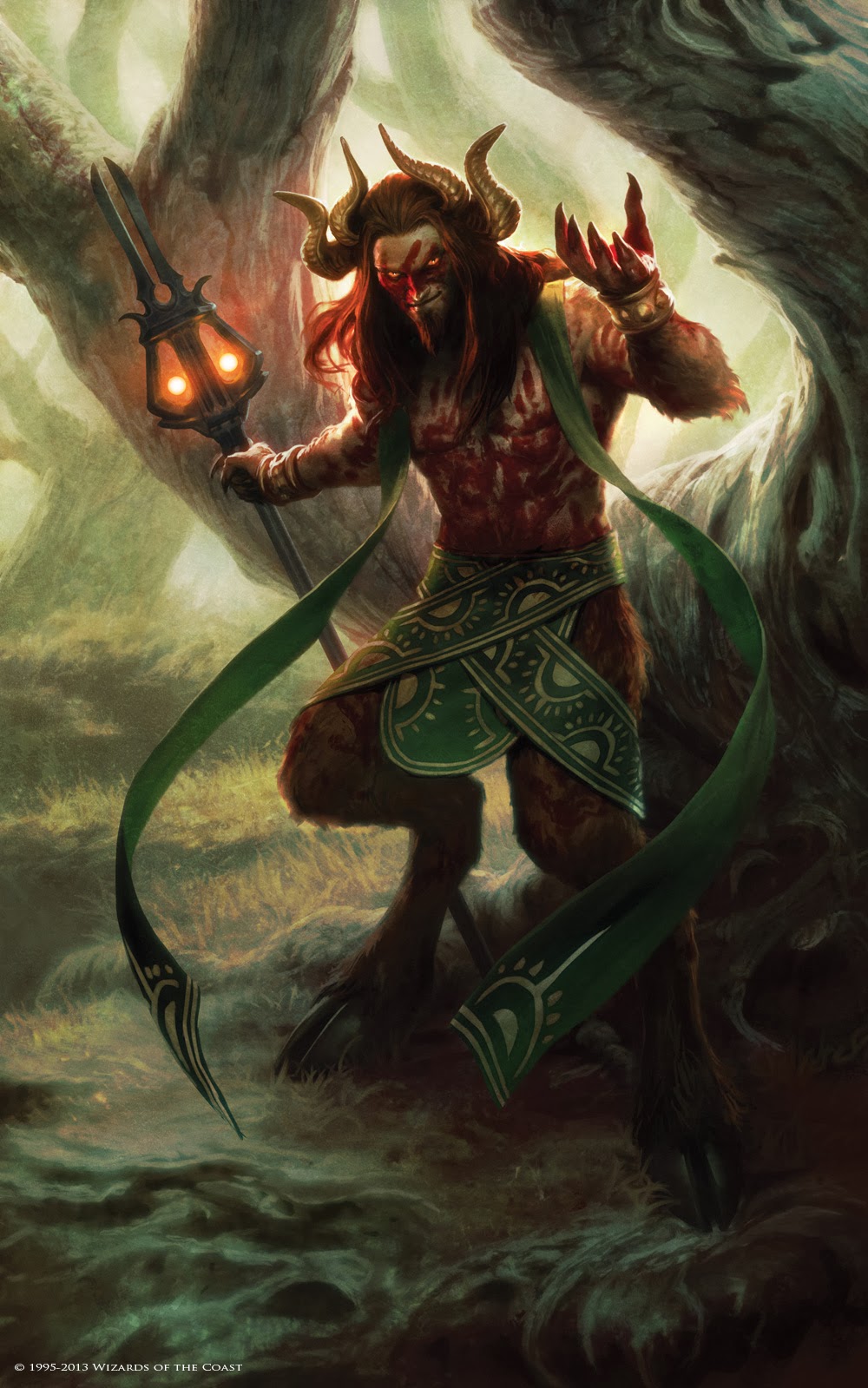

Xenagos, Ascended Planeswalker
Xenagos appears as a muscular young satyr with long brown hair and beard, brown fur down his hooves, two pairs of horns. as well as markings along his body with what appears to be red war paint.
Xenagos's history of violence and ego began before he was even born, slaying his twin sister while they were each still in the womb. In time, his mother, Raissa, would give birth, knowing that Xenagos would bear a fate destined to be something special. Unlike the others of her kind, she stayed and attempted to raise the child that she knew was fated for something great.
It was a terrible decision.
Xenagos displayed a wanton disregard for life, killing another child and leading Raissa to flee with her child from Setessa. It did not stop there though. At six, he began to attempt to murder his own mother. He seemed impressed by her ability to overcome his repeated attempts on her life, but all Raissa desired were answers. The answers she got were confusing and terrifying, as she saw visions of her son rise to challenge the gods themselves.
The Rise of King Stranger
Like the rest of his kind, Xenagos led the life of a hedonist, reveling in a carefree life of pleasure without inhibitions. At some point, this lifestyle led to his ascension, his spark igniting during the Bakkeia. Xenagos took advantage of his newfound status and perspective, engaging in revelries elsewhere in the Multiverse and enjoying the new pleasures available to him, but soon he was aware of a grim reality: that he, ultimately, was utterly insignificant in the grand scheme of things, and that the gods' reach was meaningless outside of Theros. Following the trauma of this revelation, and disillusioned with the meaningless hedonism, the satyr became progressively more ambitious.
Return to Theros
Sometime later, Xenagos returned to his birthplane, finding his old hedonistic lifestyle exceedingly dull and the gods to be a farce in which he was no longer willing to participate. His ambitions had evolved into a desire for outright godhood, to join or replace the pantheon of Theros, and so he began gathering his forces of eldritch, otherworldly monsters to attack the poleis of Meletis, Akros, and Setessa. These attacks became so severe that the gods themselves began to go blind, cut off from their oracles. This drove them into a panic which escalated as they blamed the others of their kind for the transgression. Only Nylea seemed to be aware of the threat he played, but with his otherworldly magic, none of the gods could truly stop him.
In circumstances largely under mystery, he gained knowledge that the Gods power stemmed from the devotion of their followers. Gaining enough devoted followers, he managed to ascend to godhood. This occurred during a minotaur siege at Akros, battled off by armies led by Elspeth. The victory celebration was the final ingredient to Xenagos' divine ascension, and in the ensuing turmoil, the Sun god's champion was ironically scapegoated for this, resulting in her exile to the wilderness. Xenagos held the position of the god of the revels, furthering the chaos and distrust of the established pantheon. Heliod was particularly offended by his ascension and sought to destroy the satyr, whom he refers to as "the usurper". He planned to punish all of mortal-kind for the actions of the new god.
Fall from Nyx
Xenagos had accomplished what he had desired: obtaining a place in the pantheon. However, he could not sustain his godly form by himself; he gathered a large array of Nyxborn creatures, using them to keep his position. Capturing the Nyxborn caused Theros's sky to darken, as chaos spread across the plane. His stay in Nyx would not be a long one, though. Only a couple days after his rise, Elspeth and her friend Ajani arrived in Nyx to set Theros right again. After a difficult battle, Xenagos managed to knock Elspeth down, planning on taking her weapon, Godsend, to keep his position firm. However, Elspeth managed to throw the spear into Xenagos's chest, causing the arrowhead, which Nylea had shot into Xenagos before his ascension, to explode, tearing Xenagos's organs into shreds. As Xenagos died in Nyx, he is not even in the Underworld and as such, he is truly gone.

The Story So Far
The campaign recently started - so there is not a lot you need to know yet, but if you are interested please find the story below.
The Illean Islands were always marked for their beauty and their danger, but it shortly after the ascension of Heliod that the islands truly found fame. After the sealing of the Titans, the people of the islands started to beleive that all the great devastation and dangers were behind them. A peaceful and carefree existence had taken hold for most - but thankfully not all. A small band of adventures, merchants and philosophers has started to amass around the island of Kyrin. The island, previously famous for it's small villages, open markets and gladiator pits started to attract individuals willing to challenge the Gods and the monstrosities of land, air and sea.
Stories say that the brave warriors first came together when a vicious beast started abducting people from the town. The creature, a flying beast with the head of a rat's skull and the shadow of a human, had grown from hunting sheep in the field to children in the streets. The fateful crew of adventures put short work to the beast, and began to grow a reputation. Not long after that, the tales speak of a re-appearing beast, sent by the Gods, as a burden to one of the other islands. More adventurers emerged, slaying the beast time and time again until a young boy, the child of a noble, seemed to vanquish the creature once and for all.
Now stories grow of the adventurers setting sail across the islands, recovering rare items for merchants and seeking fame and glory. Facing sirens and whirlpools, these adventurers seem to be growing in strength, piety and fame. Could they be the champions of the Gods or will they become the slayers of the Gods? Our fate remains in your hands.


Lands of Theros
Kiri
You’ve heard stories of the vast Poleis that lie beyond Kiri - the harbour to a large continent.
Aramathos
One of the larger islands in the north of the region; this rocky outcrop is home to a thriving village of seafarers. They trade with other islands and offer shelter to those seeking longer journeys.
Merlos
An island inhabited solely by Leonin - few others venture there.
Ilemi
Ilemi is a deserted rocky outcrop, few want to speak of the place.
Tamix
This populace island has multiple small cities on it and shrines to Heliod. The people of the island may seem friendly and kind, but they are devout. If you intend to spend time on the island it will be important to donate to the church, follow the hours of prayers and avoid the nights.
Sycamos
A habitable island but none speak of going there and no trades are done with the island. Sailors have reported fires coming from further onshore but none know who lives here.
Kyrin
Kyrin sees humans, Leonins and Satyrs living in harmony. One of the most bountiful islands they worship Nyela and have regular festivals of the hunt. The creatures found on this island can be magnificent but perhaps some are more dangerous than they first seem.
Fos
A small island, blessed with a port but little else to speak of. The dense woodlands that sit on this island hold a temple to Pharika. Be careful though as Pharika herself tends to the garden here and many of the plants are on the borderline between medicinal and poisonous.
Likos
This faint island on the edge of the map is believed to have a small religious group inhabiting the place - not much is known of their culture or beliefs.
Hiru
Is a small but adequate island. The island is famous for its cattle that graze in the hills surrounding the port.
Molos
Few come or go from here, and little can be seen from the sea other than the convent’s high walls.
Sinos
Sinos is known as the ‘the great market’. Each morning, tradesman arrive from all of the surrounding isles with their wares, find a place to set up in the great market, and sell to the customers who flood in from far and wide. A small and extortionately wealthy group of nobles administer the market - taxing all sales, and living lavishly on the profits.
Fotoros
The fertile land of Fotoros provides many of the goods for the great market. All kinds of things grow here, and the people say that the land has been touched by Karametra herself - to whom many shrines and temples exist.
Mutos
Mutos is a rocky island inhabited by Minotaurs, who have built their labyrinth into the mountainside. They run ships from here - sailing out to raid villages on the mainland of Kiri, and bringing back goods to trade in the great marketplace.
Elia
On this island, the soil and climate lend themselves exceptionally well to the production of wine, and Elian wine is considered by many to be the finest that can be bought, produced by the Satrys who live here. Although, it’s a wonder they manage to sell any at all, given the amount they seem to drink.
Elorini
Elorini is home to the city under the sea - and the Tritons. Few have seen the actual city- but there is plenty of talk about it. From the surface, you can see the top of the city on the peak in the bay, it is said it is larger than any city on the land in the world. On the land, there is a small community of farmers, who seem to live peacefully side by side with the Triton city.
Eos
Eos is a well known pirate town and hangout. Pirates from all over the seas return here to drink and celebrate their winnings. Fight pits, gambling dens and brothels abound in this sprawling shanty town.
Avgoros
The largest island, there are many small towns here, as well as Thiva - the closest thing these islands have to a city. A walled settlement overlooked by a fort, Thiva is multicultural and lively, with representatives of all races here. Inland, the key to the islands success is a warren of active and plentiful silver and gold mines.
The small islands to the south of here are the islands of the gods. Each one is dedicated to a god or demigod, with each temple trying to outdo the other in lavishness and excess.
Gorgos
A land of ancient ruins, nothing lives or grows on this island. An earlier civilisation seems to have lived here, and although people know little about them, they will say they dealt with devils, and brought ruin to the island.
The game is a sandbox - we will be sharing rumours and clues to things that are happening throughout. When you choose to follow them is up to you, but each session will have a particular new plot hook offered for you to follow. Discussions in the general thread can lead to particular plot hooks being followed!
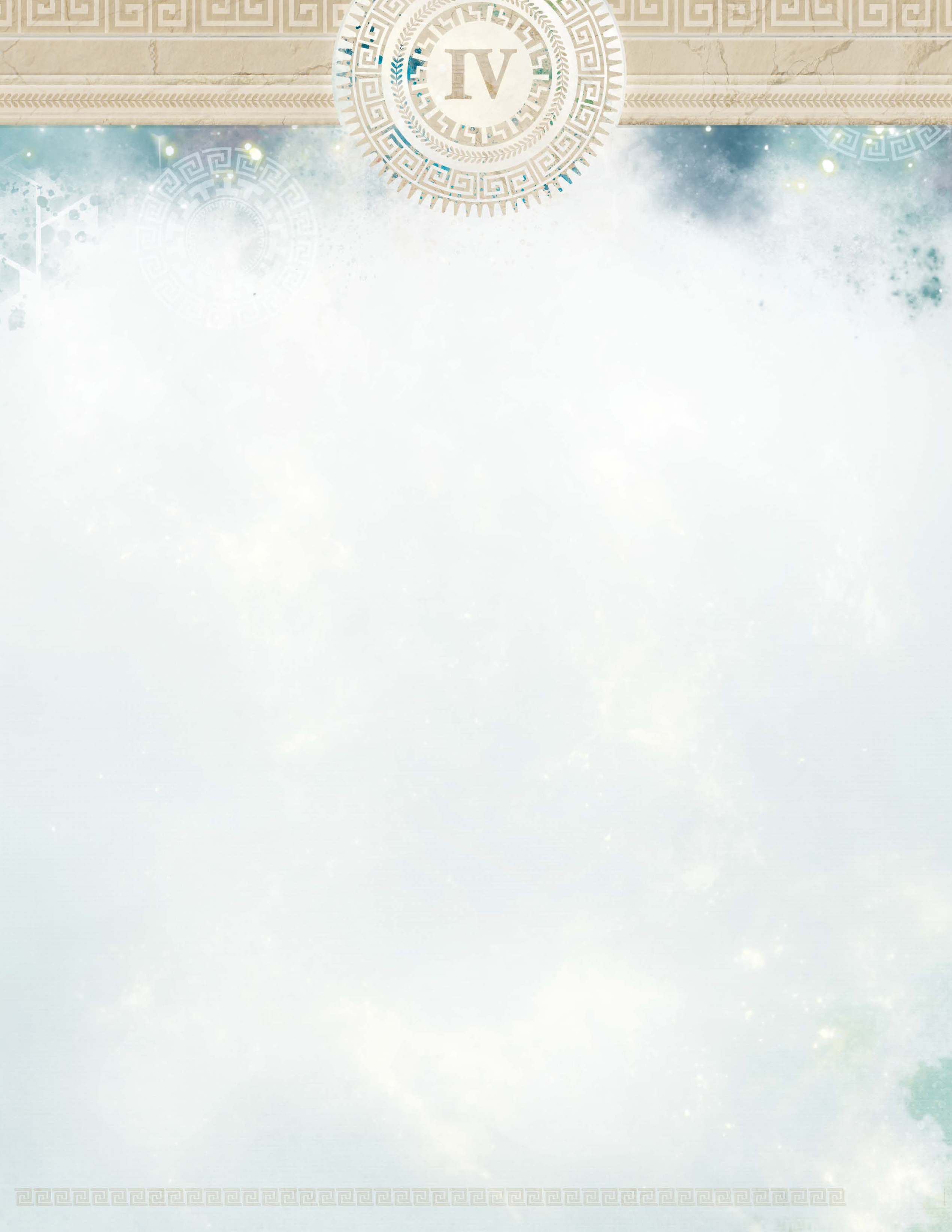

Character Creation
Building a Player Character for Theros is a very quick and straight forward process. Build your character up to the current level of the Campaign World (Currently Level 4), using the standard array for starting stats, and join a game when you are ready. You can use any class and subclass options from the Player's Handbook, Xanathar's Guide to Everything, or Mythic Odeysses of Theros. Custom backgrounds are also acceptable, as per page 125 of the players handbook.
There are race restrictions detailed in the book that reflect the plane:
- Humans on Theros are similar to those found on other D&D worlds: adaptable, ambitious, and wildly diverse.
- Centaurs employ cunning and equine strength to further the goals of the roaming Lagonna and Pheres bands.
- Leonin are proud lion-like hunters, many of whom live in defiance of the gods.
- Minotaurs are infamous for bloodthirstiness, a reputation even the most peaceful struggle to escape.
- Satyrs follow their passions in the pursuit of wild revels and new adventures.
- Tritons are an enigmatic, sea-dwelling people with an endless desire to explore.
In addition to the standard character creation rules, for any non-human race, you may replace one of your race’s +1 stat boost with a stat of your choosing. For example, the Leonin race says ‘your strength score increases by +2 and your constitution score increases by +1’ - in this campaign you can change the +1 constitution to a +1 in any stat you want. This can only be done at character creation.
We recommend building your character in the LRC's DnD Beyond Campaigns for Theros:
If you are unsure as to how to weave in the backstory - message a DM, and we will help provide additional context.
Once you have the character concept and backstory, the next thing is items / gold. We recommend using the gold option on DnD Beyond for the creation of the character creation (or equivalent in PHB). This is because you may want to customise your characters items and may want some gold left over for items in game. We would recommend carrying about 50gp into the game if possible to allow for miscellaneous costs in the cities (and perhaps a healing potion if you need it!).
Lastly, leveling will be done across the campaign by milestones. Therefore during the main campaign plot hooks players will hit certain milestones and a message will be posted on the general thread - all PCs should level up at that point. It could be from the quests or just from training (or praying to your God), but your character has leveled up!
Piety
Piety is awarded in Theros for devotion to a God, and every player should have a God. You don’t have to start the campaign with one, but quite early in the process you should make your choice.
Once a player has selected their God they are rewarded with one piety immediately. During a game a player might take an action that is befitting of the champion or devotee of the God and gain more piety. It’s at the DM discretion to award piety, but these actions may include: Doing something that is against the nature / better interest of your character for your God (and no other benefit)
- Converting a NPC or PC to your God
- Retrieving an object for your God
- Destroying something at your God’s request
- Protecting a shrine to your God
You will take part in groups which benefit many Gods but you are a champion and emissary of just one. You will be awarded piety and boons from just that God. If you wish to change God, and there may be a narrative reason to do so, please speak with the DM in the session or after to discuss how this may be possible and what level you would go in at.
If you are aligned with your God, you will get a benefit at 3 / 10 / 25 / 50 piety respectively.
In between these, particular acts for your God may be rewarded with both inspiration and piety - making something that was impossible possible thanks to your devotion to your God.
During the game, it may also be appropriate to call upon your God for a boon or assistance - it is at the discretion of the DM whether this is granted and is linked to RP.
Supernatural Gifts
When you were born in Theros, you were born into a world of mythical creatures, beasts and Gods. You are also born to a great destiny and you have a chance to get a mythical boon from the start. Check this section of the character builder in the sourcebook or talk to your DM about adding this to your character. Once you choose it, you cannot change.

Fulfil
Your
Destiny
LINKS
Discord Join our online community right now to learn all about us! (We also have Theros campaign-specfic channels for session logs and downtime)
Meetup.com Join the meetup to RSVP to Kantas (or other) games that are open.
